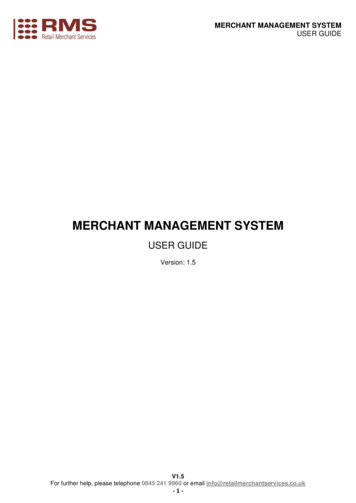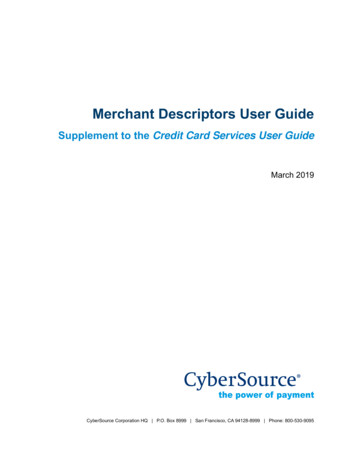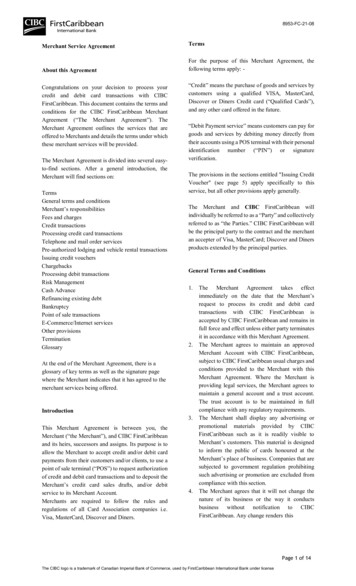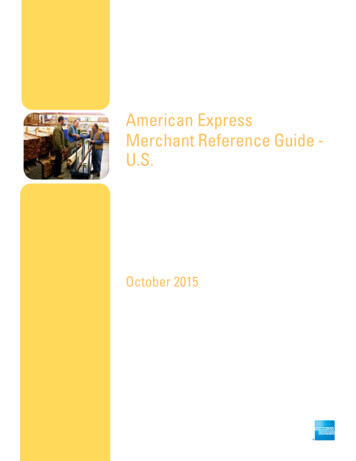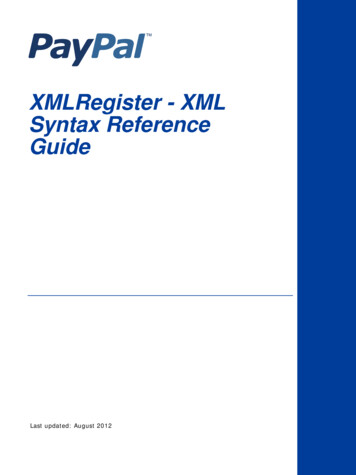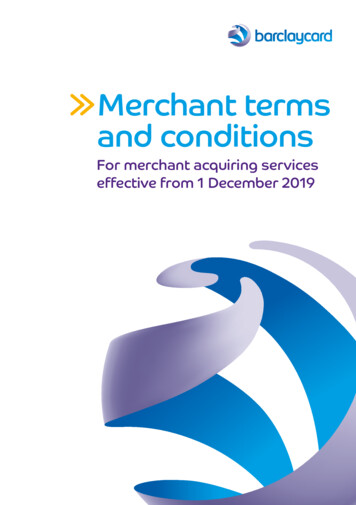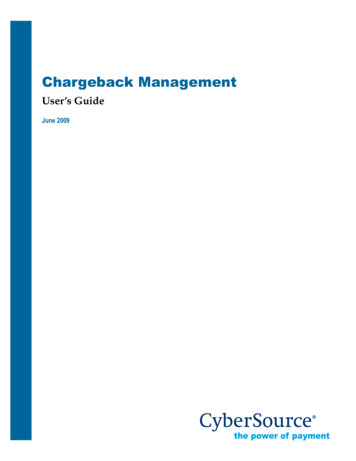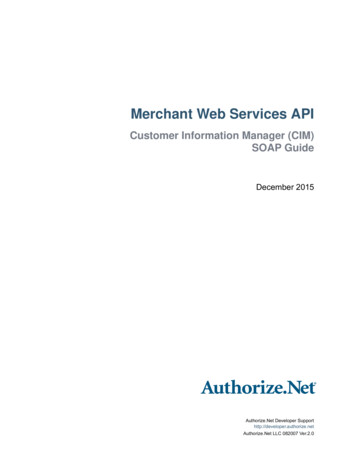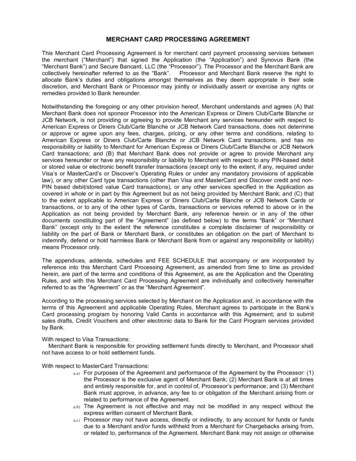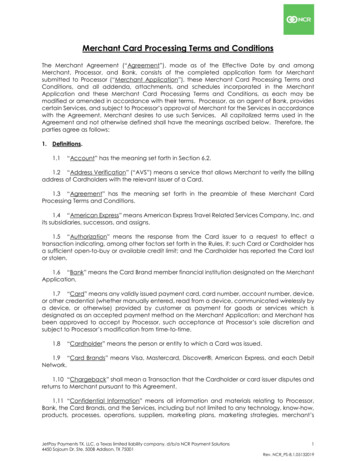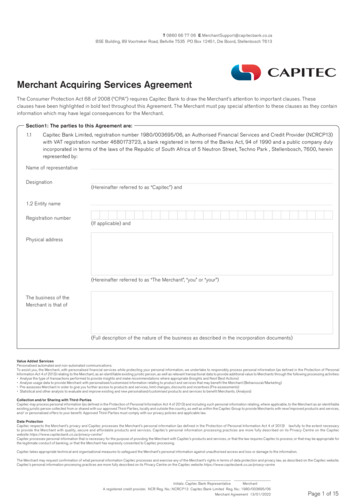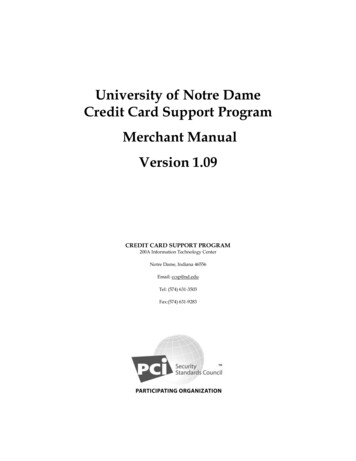
Transcription
University of Notre DameCredit Card Support ProgramMerchant ManualVersion 1.09CREDIT CARD SUPPORT PROGRAM200A Information Technology CenterNotre Dame, Indiana 46556Email: ccsp@nd.eduTel: (574) 631-3503Fax:(574) 631-9283
TABLE OF CONTENTSPAYMENT CARD INDUSTRY/CREDIT CARD SUPPORT PROGRAM OVERVIEW . 3UNIVERSITY OF NOTRE DAME PAYMENT CARD POLICIES AND STANDARDS . 10UNIVERSITY OF NOTRE DAME PAYMENT CARD POLICY . 12BUSINESS STANDARDS FOR PAYMENT CARD PROCESSING . 17TECHNICAL STANDARDS FOR PAYMENT CARD PROCESSING . 21THIRD PARTY-VENDOR GUIDELINES . 33UNIVERSITY OF NOTRE DAME PAYMENT CARD PROCESSING PROCEDURES 35MERCHANT ACCOUNT ACQUISITION PROCEDURES . 37PAYMENT CARD DATA HANDLING PROCEDURES . 39PAYMENT CARD RECONCILIATION PROCEDURES . 42PAYMENT ENVIRONMENT CHANGE APPROVAL PROCEDURE . 46POSITION MODIFICATION PROCEDURE . 48CCSP DATABASE UPDATE PROCEDURE . 51PAYMENT ACCEPTANCE METHODS . 53E-COMMERCE: THE NOTRE DAME MARKETPLACE . 55CARD PRESENT & MAIL ORDER/TELEPHONE ORDER (MOTO) TRANSACTIONS . 56VIRTUAL TERMINALS . 57OTHER PAYMENT ACCEPTANCE OPTIONS 58MOBILE PAYMENT APP . 59CCSP FORMS . 61MERCHANT CONTACT INFORMATION FORM . 63REGISTRY OF CARD PROCESSING DEVICES . 64BUSINESS CONTINUITY PLAN TEMPLATE COVER PAGE 65PAYMENT ACCEPTANCE ACTIVITY CLARIFICATION FORM . 66BUSINESS PROCESS ASSESSMENT . 67POLICY ATTESTATION FORM 68SERVICE PROVIDER ASSESSMENT . 69PCI SECURITY BACKGROUND CHECK AUTHORIZATION FORM . 70QUARTERLY NETWORK INSPECTION TEMPLATE 71SAMPLE EMAIL RESPONSE 72FREQUENTLY ASKED QUESTIONS . 74GLOSSARY 79TRAINING . 86EXTERNAL RESOURCES . 90CCSP Merchant Manual v1.09http://ccsp.nd.edu1 Page
CCSP Merchant Manual v1.09http://ccsp.nd.edu2 Page
Section 1: PCI/CCSP OverviewCCSP Merchant Manual v1.09http://ccsp.nd.edu3 Page
CCSP Merchant Manual v1.09http://ccsp.nd.edu4 Page
What is PCI DSS?The Payment Card Industry Data Security Standard, or PCI DSS, is a set of comprehensiverequirements for enhancing payment account data security. It was developed by the foundingpayment brands of the PCI Security Standards Council, including American Express, DiscoverFinancial Services, JCB International, MasterCard Worldwide and Visa Inc. International, tohelp facilitate the broad adoption of consistent data security measures on a global basis. 1The PCI DSS is a security standard that includes requirements for security management, policies,procedures, network architecture, software design and other critical protective measures. Thiscomprehensive standard is intended to help organizations proactively protect customer accountdata. It contains over 200 specific security requirements, broken down into 12 differentcategories.Who does PCI DSS apply to?All merchants and service providers who process, store, or transmit cardholder data are requiredto adhere to PCI DSS. This is enforced through contractual requirements passed down from thecard brands to all merchants through their merchant (acquiring) banks.Why is it important to comply with the PCI DSS?There are contractual, ethical, and financial reasons for adhering to the PCI DSS. Contractual: Notre Dame’s acquiring bank mandates that all merchants not only complywith the PCI DSS at all times, but also validate that compliance. In order to validatecompliance with the standard, a “Self Assessment Questionnaire” (SAQ) must becompleted annually. If a merchant does not adhere to all PCI requirements, and/or doesnot validate that those requirements are being met in a timely fashion, then the Universityis in breach of its contract and the merchant bank may choose to close the offendingmerchant account immediately, restricting the merchant from collecting any credit cardinformation as a form of payment.Ethical: When a merchant accepts a credit card, the customer trusts that their sensitivepersonal data is being protected. Only by complying with PCI DSS can merchants ensurethat they are adequately protecting that data.Financial. A 2011 Ponemon Institute study estimates that data compromises costmerchants on average 204 per affected customer. 2 Since a payment application(especially a non-compliant one) may have years worth of sensitive customer data, the1PCI Security Standards Council, About the PCI Data Security Standard (PCI DSS), available fromhttps://www.pcisecuritystandards.org/security standards/pci dss.shtml; Internet; accessed February 2009.2Ponemon Institute, LLC. 2011 Annual Study: Cost of a Data Breach, Understanding Financial Impact, CustomerTurnover, and Preventative Solutions, December 2011, p 4.CCSP Merchant Manual v1.09http://ccsp.nd.edu5 Page
number of affected customers, and the cost of a breach, can be very large.It isimpossible to identify the exact cost of a breach before it happens though. Instead, wecan identify the types of costs that you as merchant and the university as a whole wouldincur.1. Incident Response and Cleanup: This includes lost employee productivity asuniversity resources are reallocated to analyze what happened, contain the problem,repair information systems, and collect forensic evidence.2. Notification Costs: All customers who may have been affected by the datacompromise must be notified, and the university may need to offer each of thesecustomers credit monitoring services for a minimum of one year.3. Regulatory fines: The card brands levy fines on the acquiring banks for mismanagingcustomer data, which the acquiring bank then will pass onto the responsible merchant.These fines could range from several thousand to several million dollars, dependingon the size and the severity of the breach.4. Opportunity Costs: Forrester Research estimates that 10-20% of potential customerswill be lost due to a security breach in a given year.5. Audit Costs: After a breach, merchants may be required to be audited by a qualifiedthird party assessor for a minimum of one year. The cost of this outside assessment issignificantly higher than the cost of assessing ourselves internally.6. Other liabilities: Credit card replacement and civil penalties for those affected canpotentially add to the already significant costs of a breach.3It’s possible to view the importance of PCI Compliance from several different perspectives, butonly by looking at the issues from contractual, ethical, and financial perspectives can you beginto see the big picture of why it is so important for all of us as an institution to adhere to the PCIDSS.What is the role of the Credit Card Support Program (CCSP)?The PCI DSS is cross-functional by its very nature. In order to fully protect credit card data,both technical and business related requirements must be followed. For example, from thebusiness side, proper mail and paper handling procedures must be followed, and employees mustreceive background checks prior to employment; from the technical side, proper networkencryption and firewall settings must be followed. These cross-functional requirements make itunderstandably difficult for a single merchant to ensure and verify all aspects of theircompliance.3Secure Works, Security 101: Cost of a Breach, available /2007/10/; Internet; accessed February 2009.CCSP Merchant Manual v1.09http://ccsp.nd.edu6 Page
The Credit Card Support Program oversees several activities that help merchants maintain theirPCI DSS Compliance. The CCSP centrally manages the following:Account Management: Computer accounts for individuals that can access cardholderdata must be managed to a strict standard, and require multi-factor authentication foraccess. The CCSP manages these accounts and assists users with their accounts,passwords, or tokens.SAQ Submission: The CCSP helps to coordinate all of the activities required formerchants to validate PCI DSS compliance and submit SAQs. Rather than requiring thateach individual merchant work with HR, Information Security, and other departments toanswer the SAQs in full, the CCSP Office has divided the SAQs into department specificassessments. (Some of these assessments can be found in Section 5 of this document.)This way, the merchant only needs to answer applicable questions, while the otherassessments are answered by the appropriate subject matter experts. The CCSP officeaggregates all of the assessment answers into the SAQ, requests approval from theappropriate officer responsible for the merchant activity, and then submits the SAQ to thebank. This process occurs once per year for every merchant at the University. (Somedepartments manage more than one merchant account.) The timing of this process willvary depending on your merchant account.New Merchant Approval: Before the University’s merchant bank will permit any fundsto flow though a new merchant account, they must verify that certain security measuresconsistent with PCI DSS are in place. The CCSP facilitates this new account setup andensures that the merchant can and will comply with PCI DSS. As part of this process, allproposed merchant activity is reviewed by the Information Governance Committee andapproved by the Vice President Finance.Payment Environment Change Approval:Because a merchant’s paymentenvironment is typically not static and can require changes to scope, technology, location,etc, it is possible for a merchant that was once meeting the PCI DSS to become noncompliant. To prevent this from happening, the Information Governance Committeemust review all proposed changes to the campus payment environment.PCI DSS Awareness: The CCSP oversees a multifaceted security awareness program,which includes, among other things, online training, an informational website, merchantmeetings, and this manual.In addition to the clear benefit of educating campusmerchants about credit card security, having such an awareness program is a requirementof the PCI DSS.CCSP Merchant Manual v1.09http://ccsp.nd.edu7 Page
Who is the Information Governance Committee?The purpose of the Information Governance Committee is to ensure that all requirements of thePCI DSS are met, and to guarantee that all necessary stakeholders review any card processingactivity or change in card processing activity before implementation. The Committee ensuresthat merchant activities are aligned with University goals and policies.David BaileyStrategic Planning Program DirectorOffice of Strategic PlanningRon KraemerVP & Chief Information and DigitalOfficerOffice of Information TechnologyMike ChappleSenior Director Enterprise SupportServicesOffice of Chief Information OfficerRoger MahoneyDirector Audit & Advisory ServicesOffice of Audit & Advisory ServicesTimothy FlanaganAssociate General CounselOffice of General CounselDrew PalufAVP ControllerOffice of the ControllerTamara FreemanDirector Talent Management & HRStrategyOffice of the ControllerMatthew BlazejewskiEVP Senior AdvisorOffice of Executive Vice PresidentTodd HillSenior Director Academic &Administrative ServicesOffice of Chief Information OfficerLiz RulliAVP ResearchOffice of ResearchChuck HurleyUniversity RegistrarOffice of the RegistrarScott Kirner (standing guest)Director Application DevelopmentOffice of Information TechnologyMicki KidderAVP Development AdvancementServices & FinanceOffice of Development ServicesCCSP Merchant Manual v1.09http://ccsp.nd.edu8 Page
CCSP Merchant Manual v1.09http://ccsp.nd.edu9 Page
Section 2: University of Notre DamePayment Card Policies and StandardsCCSP Merchant Manual v1.09http://ccsp.nd.edu10 P a g e
CCSP Merchant Manual v1.09http://ccsp.nd.edu11 P a g e
University of Notre Dame Payment Card PolicyMerchant Account Acquisition and UsageAll card processing activities of the University of Notre Dame will be conducted throughmerchant accounts obtained through the Merchant Account Acquisition Procedure.Notre Dame merchant accounts will be issued only to particular Notre Dame entities for aspecific use. Accounts operated by parties other than the approved entity or for a purpose otherthan that approved may be rescinded without notice.Protection of Cardholder InformationAll card processing activities and payment technologies of the University of Notre Dame mustcomply with the Payment Card Industry Data Security Standard (PCI DSS) as described in theNotre Dame payment card standards and procedures. No activity or technology may obstructcompliance with the PCI DSS.Through regular meetings with the Operational Oversight Committee and related workinggroups, the Credit Card Support Program (CCSP) will conduct an annual process that identifiesthreats, and vulnerabilities, and results in a formal risk assessment.The University will screen potential employees to minimize the risk of attacks from internalsources.The University will contractually require all third parties with access to cardholder data to adhereto PCI DSS requirements. These contracts will clearly define information securityresponsibilities for contractors.Alteration of Card Processing EnvironmentAny alteration of the card processing environment must receive explicit written approval throughthe Payment Environment Change Approval Process. Changes include but are not limited to: the use of existing merchant accounts for new purposes,the alteration of business processes that involve card processing activities,the addition or alteration of payment systems,the addition or alteration of relationships with third-party payment card service providers,the addition or alteration of payment card processing technologies or channels.CCSP Merchant Manual v1.09http://ccsp.nd.edu12 P a g e
Cellular Modem and Wired-Analog Modem Uplink Devices and UsageFor changes involving the use of cellular wireless technology or the installation of analog wiredmodems on systems that store, process or transmit cardholder data, the following details must beprovided to complete the Payment Environment Change Approval Process: A description of authentication technology in place,A list of all devices and personnel with access,For wired modems, a proposed connectivity time-out period (All modems mustautomatically disconnect sessions after a specified period of inactivity.)Approval of the change will include: Specific acceptable use(s) chosen for the technologySpecific approved network location(s) for the technologySpecific approval of the product(s) usedIn general, the University disallows and discourages the use of cellular wireless uplinktechnology for card processing activities. If approved, all devices will be labeled with theowner, contact information, and purpose of the device, prior to deployment of the technology.802.11 Wireless LANs will not be connected to, or part of, the cardholder data environment.When accessing cardholder data remotely via wireless or wired modem, it is prohibited to storecardholder data on local hard drives, floppy disks or other external media. It is also prohibited touse cut-and-paste and print functions during remote access. Activation of modems for vendorswill occur only when needed, with immediate deactivation after use.ApplicabilityThis policy applies to all University of Notre Dame employees and students.ResponsibilitiesThe CCSP will:1. Establish, document and distribute security policies and procedures.2. Make all employees aware of the importance of cardholder information securitythrough a formal security awareness program.3. Assist merchants with the completion and submission of all PCI-DSS SelfAssessment Questionnaires.4. Administer the Payment Environment Change Approval Process wherein changes tothe payment environment are approved by Information Governance Committeeand/or by the Vice Presidents for Finance and Business Operations.5. Administer the Merchant Account Acquisition Procedure wherein new accounts areapproved by the Information Governance Committee.CCSP Merchant Manual v1.09http://ccsp.nd.edu13 P a g e
6. Maintain a current list of service providers, and procedures to manage those serviceproviders.OIT Information Security will:1. Establish, test, document, revise as needed, and distribute security incident responseand escalation procedures to ensure timely and effective handling of all situations.2. Monitor and analyze security alerts and information and distribute to appropriatepersonnel.3. Information Security will conduct an annual risk assessment of the CCSP. Theassessment will identify threats and vulnerabilities, and will include input frommanagers, administrators, and users of the environment. The results of theassessment will be documented and available for review.Administrators of card processing systems and applications will:1. Administer user accounts, including additions, deletions and modifications.2. Monitor and control all access to data.Merchants will:1. Ensure that all of their employees and business processes comply with this policy andrelated procedures.2. Identify positions that require access to cardholder data, specifying positions withaccess to multiple instances of cardholder data.3. Notify Human Resources through their department’s HR Business Partner and theCCSP of all staff changes in positions with Privileged Access to Cardholder Data.4. Make their employees aware of the importance of cardholder information security.Human Resources will:1. Screen potential employees in identified positions to minimize the risk of attacksfrom internal sources.Office of Information Technologies will:1. CCSP technical duties and privileges are assigned by job classification and function.The following CCSP roles have been assigned to these departments or groups: Server OS engineering and administration: EIS System ServicesVMWare engineering and administration: EIS System ServicesNetwork engineering (not firewall): EIS Network ServicesActive Directory engineering: EIS Directory SupportFirewall services: ESS Information SecurityMonitoring and testing: ESS Information SecurityDesktop support: CSS Desktop Support and Desktop EngineeringCCSP Merchant Manual v1.09http://ccsp.nd.edu14 P a g e
Application administration: merchantsReviewCCSP will review this policy and related procedures annually. This policy and relatedprocedures will be updated when the card processing environment changes.ExceptionsExceptions to this policy or related procedures must be approved through the InformationGovernance Committee.CCSP Merchant Manual v1.09http://ccsp.nd.edu15 P a g e
CCSP Merchant Manual v1.09http://ccsp.nd.edu16 P a g e
Business Standard for Payment Card ProcessingAccount AcquisitionNotre Dame merchant accounts will be issued only to particular Notre Dame entities for aspecific use and must be obtained through the Merchant Account Acquisition Procedure.Roles and ResponsibilitiesEach merchant must identify individual(s) to fill the following roles for each merchant account.(An individual may fulfill multiple roles.)DirectorThe Director of the area is responsible for ensuring that employees are familiar with andadhere to all payment card policies, standards, and procedures. The Director may need toapprove change requests made through the Payment Environment Change ApprovalProcess.Account OwnerThe Account Owner is the primary contact for merchant account communications issuedby the merchant bank and the CCSP. To facilitate the annual completion of the industryrequired Self Assessment Questionnaire (SAQ), the Account Owner is responsible formaintaining and providing certain information to the CCSP upon request. Specifically,the Account Owner must: complete the Business Process Assessment (a brief, yes-no-N/A questionnaire)maintain the Registry of Card Processing Personnelreport position changes (as described below)assist in identifying other departmental resources, as necessary to complete the SAQact as the merchant’s Business Continuity CoordinatorBusiness ManagerThe Business Manager is responsible for reconciliation of all operating accounts wherepayment card revenue is deposited. Where revenue is credited to an unearned revenueaccount, the Business Manager is responsible for transferring funds to the appropriateoperating ledger account(s). Detailed reconciliations are to be maintained by the businessmanager. The Merchant Card Coordinator should be contacted for assistance or questionsregarding reconciliation. (See Payment Card Reconciliation Procedures.)IT ContactThe IT Contact will maintain the Registry of Card Processing Devices for all merchantequipment attached to the card processing environment. The registry must be available toCCSP Merchant Manual v1.09http://ccsp.nd.edu17 P a g e
the CCSP upon request. The IT Contact will assist in completing the technical sectionsof the annual Self Assessment Questionnaire, if necessary.Changes to contact information for these roles will be reported using the Merchant ContactInformation Form, immediately upon changing.Data HandlingObserve the following data handling requirements: Keep cardholder data storage to a minimum by complying with the requirements detailedin the Payment Card Data Handling Procedures.Never store the card security code (three-digit or four-digit number printed on the front orback of a payment card).Do not store the personal identification number (PIN) or the encrypted PIN block.Only the first six and the last four digits of a payment card may be displayed.Never send or request card numbers by any end user messaging technologies (e.g. email,voicemail, instant messaging, and text messaging).Procurement of Payment Systems or ServicesAddition of new payment systems or services is considered a change in the University’s paymentenvironment and must follow either the Payment Environment Change Approval Process or theMerchant Account Acquisition Procedure. The CCSP will work with OIT, Procurement Services,and the Merchant to assist in selecting and implementing any new payment system.Position ChangesFor employees with privileged access (i.e., employees with access to more than one instance ofcardholder data), merchants must follow the Position Modification Procedure when filling orterminating the position.Reconciliation and DisputesObserve the Payment Card Reconciliation Procedures to protect the integrity of fiscal data and toreduce the risk of fraud.Security AwarenessThe Account Owner, Business Manager, and all other individuals who process or have access tocardholder data are required to complete the CCSP Security Awareness Training, upon hire(before handling or having access to cardholder data) and annually. Additionally, theseindividuals must sign and submit the Policy Attestation Form annually after reviewing allpayment card policies.CCSP Merchant Manual v1.09http://ccsp.nd.edu18 P a g e
System ManagementObserve the following system management requirements: Manage all computer systems according to the Technical Standard for Payment CardProcessing Systems.Limit access to computing resources (e.g., computers, network jacks, wireless accesspoints, gateways, and handheld devices) and cardholder information only to thoseindividuals whose jobs require such access.Business Continuity PlanningIt is required that all merchants have a business continuity plan and that they provide that plan tothe CCSP office annually. Merchants must be aware that in the case where the CCSP has beenbreached or in the event of a disaster the environment may be unavailable for a time period noshorter than 48 hours and may be unavailable for a time period greater than one month whileinvestigations are being conducted or recovery efforts are under way. For those merchants thatare using third party service providers it is the responsibility of the merchant to be aware of theirservice provider’s business continuity plan and also to be able to provide that information to theCCSP office.ApplicabilityThis standard applies to all University of Notre Dame employees and students.CCSP Merchant Manual v1.09http://ccsp.nd.edu19 P a g e
CCSP Merchant Manual v1.09http://ccsp.nd.edu20 P a g e
Technical Standard for Card Processing SystemsNote: These standards apply to systems in the CCSP environment and virtual terminals.Computer RequirementsConfigurationAll devices must be properly labeled with information that can be correlated to owner andcontact information.Any vendor-supplied defaults (e.g. passwords, SNMP strings, unnecessary accounts)must be changed before connecting any system to the network.Each system must serve only one primary function and all unnecessary functionality mustbe removed.Systems must be configured to meet the applicable Notre Dame security standard as abaseline. In cases where this standard and the Notre Dame standard conflict, thisstandard takes precedence.Any non-console administrative access to a system must be encrypted.Systems commonly affected by malware must have antivirus software installed andconfigured to log to the central log server. This software must retrieve updates daily.Personal firewall software must be installed on all Notre Dame owned and maintainedcomputers with direct connectivity to the Internet which are used to access the cardholderdata environment.Only Notre Dame owned and maintained computers are allowed to connect to CCSPenvironment.Any changes to system configuration must be completed through the OIT ChangeControl Process. The change request must include: Documentation of impactManagement approvalInformation Security approvalTest documentationBack-out proceduresSystem firewalls must be configured to allow only traffic required for documentedbusiness purposes.AuthenticationCCSP Merchant Manual v1.09http://ccsp.nd.edu21 P a g e
System authentication should use centralized authentication, where possible. Unlessdocumented, the only local account should be an administrator account for emergencyuse. The password to that account must be stored in the OIT safe in a sealed envelope.All users must complete an authorization form explicitly approved by management thatspecifies required privileges. The Assyst RFC System is one tool that may be used tomeet this requirement.All system users must be identified with a unique username and all accounts must beprotected by passwords that meet the following requirements (in addition to theUniversity Strong Password Policy Requirements): Accounts that are inactive for more than 90 days must be automatically disabledNo password may be shared by multiple usersAccounts must be locked out for 30 minutes after six unsuccessful login attemptsSystems must be configured to use a password-protected screen saver after 15 minutes ofinactivity.Passwords must be encrypted during transmission and storage on all system components.Any remote access to the system must take place through the PCI environment VPNusing two-factor (SafeWord) authentication. VPN connection must be immediatelydeactivated when work is completed. It is prohibited for the copying, moving, or storingof cardholder data onto local hard drives and removable electronic media when remoteaccessing the PCI environment.MonitoringThe following events must be logged to the central log server: Access to cardholder data by an individualActions taken by users with administrative privilegesAccess to audit trailsInvalid logical access attemptsUse of identification and authentication mechanismsInitialization of the audit logsCreation and deletion of system-level objectsEvery event logged to the central log server must include the following details: User identificationType of eventDate and timeSuccess or failure indicationOrigination of eventCCSP Merchant Manual v1.09http://ccsp.nd.edu22 P a g e
Identity or name of affected data, system component or resourceLogs must be reviewed daily with review of all exceptions. Audit logs must be retained for one yearThe last three months of audit logs must be immediately available for analysisAll system clocks must be synchronized with the PCI environment’s NTP servers.Systems must run Tripwire with the policy configured to: Ensure that logs may not be altered without generating an alert (new data beingadded should not generate an alert)Alert on any changes to critical files, the modification of which could indicate asystem compromise or risk of compromiseReviews of tripwire reports should be performed weekly with discrepancies beingreconciled by OIT- EIS staff.Updates Ensure that all system components and software have the latest vendor-suppliedsecurity patches installed. Install relevant security patches within one month ofrelease. Terminal downloads will be authorized through the Merchant CardCoordinator.Follow the Change Control Procedure for all applicable changes.Firewall and Network Device RequirementsConfigurationFirewalls and network devices must be configured to meet the applicable Notre Damesecurity standard as a baseline. In cases where this standard and the other Notre Damesecurity standards conflict, this standard takes precedence.Security administrators shall conduct a review of all firewall and router rule sets every sixmonths. (The OIT Information Security staff is responsible for the maintenance,management and configuration of the main CCSP firewalls. OIT Network Services isresponsible for the maintenance, management and configuration of network switches,remote site VPN endpoints
with the PCI DSS at all times, but also validate that compliance. In order to validate compliance with the standard, a "Self Assessment Questionnaire" (SAQ) must be completed annually. If a merchant does not adhere to all PCI requirements, and/or does not validate that those requirements are being met in a timely fashion, then the University
